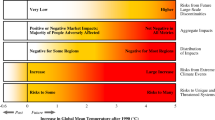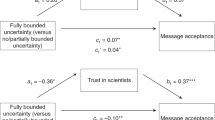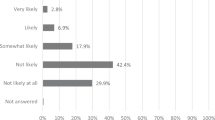Abstract
Here we demonstrate that speakers at the press conference for the publication of the IPCC’s Fifth Assessment Report (Working Group 1; ref. 1) attempted to make the documented level of certainty of anthropogenic global warming (AGW) more meaningful to the public. Speakers attempted to communicate this through reference to short-term temperature increases. However, when journalists enquired about the similarly short ‘pause’2 in global temperature increase, the speakers dismissed the relevance of such timescales, thus becoming incoherent as to ‘what counts’ as scientific evidence for AGW. We call this the ‘IPCC’s certainty trap’. This incoherence led to confusion within the press conference and subsequent condemnation in the media3. The speakers were well intentioned in their attempts to communicate the public implications of the report, but these attempts threatened to erode their scientific credibility. In this instance, the certainty trap was the result of the speakers’ failure to acknowledge the tensions between scientific and public meanings. Avoiding the certainty trap in the future will require a nuanced accommodation of uncertainties and a recognition that rightful demands for scientific credibility need to be balanced with public and political dialogue about the things we value and the actions we take to protect those things4,5,6.
This is a preview of subscription content, access via your institution
Access options
Subscribe to this journal
Receive 12 print issues and online access
$209.00 per year
only $17.42 per issue
Buy this article
- Purchase on Springer Link
- Instant access to full article PDF
Prices may be subject to local taxes which are calculated during checkout




Similar content being viewed by others
References
IPCC Climate Change 2013: The Physical Science Basis (eds Stocker, T. F. et al.) (Cambridge Univ. Press, 2013).
Hawkins, E., Edwards, T. & McNeall, D. Pause for thought. Nature Clim. Change 4, 154–156 (2014).
Rose, D. Met Office proof that global warming is still ‘on pause’ as climate summit confirms global temperature has stopped rising. Mail Online (28 September 2013); http://go.nature.com/l9GoAo
Jasanoff, S. A new climate for society. Theory, Cult. Soc. 27, 233–253 (2010).
Lejano, R. P., Tavares-Reager, J. & Berkes, F. Climate and narrative: Environmental knowledge in everyday life. Environ. Sci. Policy 31, 61–70 (2013).
Siebenhüner, B. The Role of ‘Experts’ in International and European Decision-Making Processes 126–147 (Cambridge Univ. Press, 2014).
Star, S. L. Scientific work and uncertainty. Soc. Stud. Sci. 15, 391–427 (1985).
Edwards, P. N. A Vast Machine: Computer Models, Climate Data, and the Politics of Global Warming (MIT Press, 2010).
Adger, W. N., Barnett, J., Chapin, F. S. III & Ellemor, H. This must be the place: Underrepresentation of identity and meaning in climate change decision-making. Glob. Environ. Polit. 11, 1–25 (2011).
Fahnestock, J. Accommodating science: The rhetorical life of scientific facts. Writ. Commun. 15, 330–350 (1998).
Principles Governing IPCC Work (IPCC, 2012); http://www.ipcc.ch/pdf/ipcc-principles/ipcc-principles.pdf
Communications Strategy (IPCC, 2012).
Bucchi, M. Science and the Media: Alternative Routes to Scientific Communications (Routledge, 2012).
Hajer, M. A. Authorative Governance: Policy Making in the Age of Mediatization (Oxford Univ. Press, 2009).
Shackley, S. & Wynne, B. Representing uncertainty in global climate change science and policy: Boundary-ordering devices and authority. Sci. Technol. Human Values 21, 275–302 (1996).
Zehr, S. C. Public representations of scientific uncertainty about global climate change. Public Underst. Sci. 9, 85–103 (2000).
Leck, H., Sutherland, C., Scott, D. & Oelofse, G. in Overcoming Barriers to Climate Change Adaptation (eds Masters, L. & Duff, L.) 61–83 (Institute for Global Dialog, 2011).
Midgley, M. The Myths We Live By (Routledge, 2003).
IPCC Summary for Policymakers in Climate Change 2013: The Physical Science Basis (eds Stocker, T. F. et al.) (Cambridge Univ. Press, 2013).
Carrington, D. IPCC: Rapid carbon emission cuts vital to stop severe impact of climate change. The Guardian (2 November 2014); http://go.nature.com/bCsahQ
Hulme, M. Why We Disagree About Climate Change (Cambridge Univ. Press, 2009).
Jaspal, R. & Nerlich, B. When climate science became climate politics: British media representations of climate change in 1988. Public Underst. Sci. 23, 122–141 (2014).
Rose, D. Global warming stopped 16 years ago, reveals Met Office report quietly released... and here is the chart to prove it. Mail on Sunday (13 October 2012); http://go.nature.com/ckAtqU
Rose, D. The great green con no. 1: The hard proof that finally shows warming forecasts that are costing you billions were WRONG all along. Mail on Sunday (16 March 2013); http://go.nature.com/62eFbK
Cook, J. et al. Quantifying the consensus on anthropogenic global warming in the scientific literature. Environ. Res. Lett. 8, 024024 (2013).
Lewandowsky, S., Gignac, G. E. & Vaughan, S. The pivotal role of perceived scientific consensus in acceptance of science. Nature Clim. Change 3, 399–404 (2012).
Wynne, B. Strange weather, again: Climate science as political art. Theory, Cult. Soc. 27, 289–305 (2010).
Geden, O. & Beck, S. Renegotiating the global climate stabilization target. Nature Clim. Change 4, 747–748 (2014).
Suleski, J. & Ibaraki, M. Scientists are talking, but mostly to each other: A quantitative analysis of research represented in mass media. Public Underst. Sci. 19, 115–125 (2010).
Moore, A. Bad science in the headlines. EMBO Rep. 7, 1193–1196 (2006).
Nelkin, D. Selling Science: How the Press Covers Science and Technology (W. H. Freeman and Company, 1995).
Star, S. L. Regions of the Mind: Brain Research and the Quest for Scientific Certainty (Stanford Univ. Press, 1989).
Mellor, F. Negotiating uncertainty: Asteroids, risk and the media. Public Underst. Sci. 19, 16–33 (2010).
Moreira, T., May, C. & Bond, J. Regulatory objectivity in action: Mild Cognitive Impairment and the collective production of uncertainty. Soc. Stud. Sci. 39, 665–690 (2009).
Pickersgill, M. Ordering disorder: Knowledge production an uncertainty in neuroscience research. Sci. Cult. 20, 71–87 (2011).
Webster, A. J. & Eriksson, L. Standardising the unknown: Practicable pluripotency as doable futures. Sci. Cult. 17, 57–69 (2008).
Landman, T. in Real Soc. Sci. Appl. Phronesis (eds Flyvbjerg, B., Landman, T. & Schram, S.) 27–47 (Cambridge Univ. Press, 2012).
Acknowledgements
W.P. acknowledges the support of the Leverhulme Trust’s Making Science Public programme (RP2011-SP-013). G.J.S.H.’s research is supported by a Mildred Blaxter Post-Doctoral Fellowship from the Foundation for the Sociology of Health and Illness. We would like to thank T. Edwards, M. Hulme and B. Nerlich, colleagues at Science and Democracy Network, for comments that have helped us to improve the argument. Responsibility for the content of the paper remains ours alone.
Author information
Authors and Affiliations
Contributions
Both G.J.S.H. and W.P. contributed fully to all aspects of this submission and acknowledge joint first authorship.
Corresponding author
Ethics declarations
Competing interests
The authors declare no competing financial interests.
Rights and permissions
About this article
Cite this article
Hollin, G., Pearce, W. Tension between scientific certainty and meaning complicates communication of IPCC reports. Nature Clim Change 5, 753–756 (2015). https://doi.org/10.1038/nclimate2672
Received:
Accepted:
Published:
Issue Date:
DOI: https://doi.org/10.1038/nclimate2672
This article is cited by
-
Improving the usability of climate indicator visualizations through diagnostic design principles
Climatic Change (2021)
-
The visual framing of climate change impacts and adaptation in the IPCC assessment reports
Climatic Change (2019)
-
Framing the challenge of climate change in Nature and Science editorials
Nature Climate Change (2018)
-
Linguistic analysis of IPCC summaries for policymakers and associated coverage
Nature Climate Change (2016)
-
Cognitive and psychological science insights to improve climate change data visualization
Nature Climate Change (2016)



